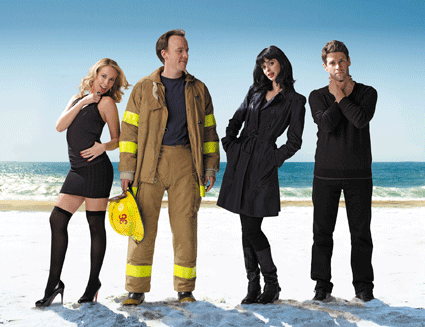It’s interesting how suicide and comedy make such great bedfellows. When “All New People,” Zach Braff’s first foray into playwriting, begins, a young scruffy man is hanging from an orange noose in a beach house on Long Beach Island, NJ. What may seem like a dark, uncomfortable subject becomes the catalyst for 90 snappy and hilarious minutes. As Charley (Justin Bartha) swings like a suicidal Tarzan, an enthusiastic British girl named Emma (Krysten Ritter) bursts in. It turns out that she was supposed to show the house to “some old Jews.” Her presence of course stops his suicide attempt. We are soon joined by Myron (David Wilson Barnes), the neighborhood fireman and Emma’s sometimes boyfriend, and Kim (Anna Camp) an “escort” sent to Charley to cheer him up. As each character comes in, the ridiculousness only gets heightened and the laughs only increase.
Just as in an Agatha Christie novel the objective is to figure out who committed the crime, the central task at hand in this play is to find out who Charley really is, and why he wanted to end his life so badly. Even though that is the only real plot development that occurs, the characters are so specific and interesting to watch that the action itself doesn’t matter. Though each of them start off a little grating at the beginning, as details about their pasts are revealed through movie style flashbacks on a giant screen, they become instantly more likable. Charley seems sardonic and depressed, Emma seems too neurotic and drugged out, Myron seems like a hedonistic coke addict and Kim seems like a traditional dumb blonde stripper, but their inner layers are worth a second look. This multidimensionality can be attributed not just to the writing but to the stellar actors as well.
I consider myself to be a Braff enthusiast: I have watched and loved many a “Scrubs” episode, enjoyed “Garden State” (his directorial and screenwriting debut) and even saw him in his Second Stage acting debut in “Trust” last summer. Going into the play, I knew Zach Braff could act, write movies and direct them. But I was a little skeptical about his ability to even write a play, let alone a good play. “All New People” proved that though his first attempt may be imperfect– I would have liked to see the female roles fleshed out more, and the concept of strangers stuck in a room is a bit overdone, playwriting is another of Braff’s great skills. Like the captain of any ship, Braff knows how to steer an audience into dark territory (suicide, drugs, prostitution, diseases) and out of it with humor and ease.
There are moral quandaries and questions about faith that lurk under and probe into the play. If Emma hadn’t burst in like the basketcase she is, would Charley have actually killed himself? Was Emma a sign from God? Does God even exist? Pretty heavy material for a comedy. Yet these questions are dealt with gently and no answers are provided. The play is commendable just for its lack of preachiness.
All New People is an enjoyable hour and a half that audiences who feel prepared to deal with the above subjects and some coarse language will enjoy. Not a completely superficial comedy but not a deep melodrama (though leaning toward the former), the play provides just enough to chew on. Then, the viewer can walk out satiated.

Comments
Leave A Comment